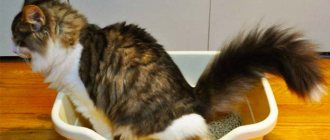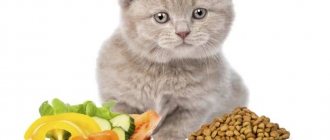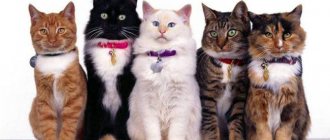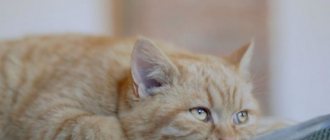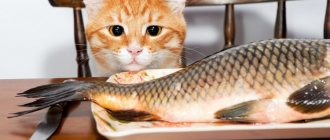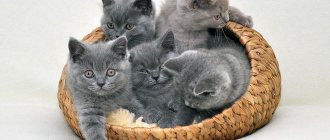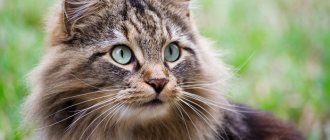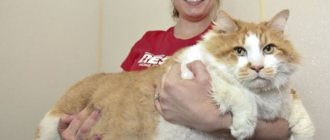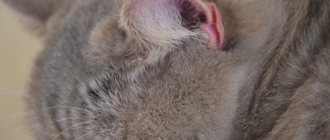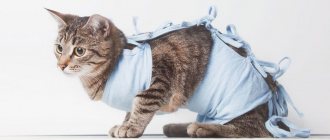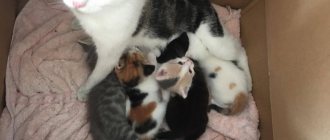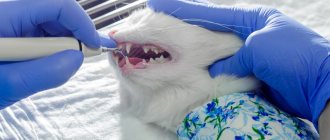Castration is a serious surgical intervention in the vital functions of an animal’s body. This is not just ridding the cat of sexual desire by removing the testicles. Such interventions have an impact on subsequent behavior, habits and functioning of the body. The owner needs to understand how to feed a castrated cat correctly, how to care for him, and what his needs are.
Changes in the body after castration
Domestic cats are castrated without asking their opinion, primarily to solve practical problems. An overly active and sometimes aggressive animal becomes calmer, sometimes even inert. In addition, the alpha male stops marking his territory, losing interest in the opposite sex. This helps get rid of the persistent “cat” odor, which in a sexually active cat is very unpleasant to human perception.
The testicles and gonads in cats perform the same functions as in other mammals, including humans. They produce sex hormones necessary for the stable functioning of the reproductive system. Their removal entails a serious hormonal imbalance. While the main restructuring is underway, the cat can remain active and continues to leave “marks.”
However, after some time, the owners notice that the animal has calmed down and no longer carries out night chases.
The cat, having lost its masculine strength, instinctively seeks a replacement. And most often it is found in food. And the owners, especially if they are worried, feel guilty for depriving the animal of “masculinity”, begin to intensively pamper the pet with various goodies. Coupled with the decrease in physical activity that occurs after castration, this regime leads to obesity. Therefore, owners need to pay increased attention to the cat’s nutrition after such an operation, because excess weight is the cause of the development of many diseases.
In addition to obesity, cats are also at risk for other health problems. The most likely danger of neutered cats is the development of urolithiasis. The fact is that after the operation, not only the hormonal balance is rearranged, changes also occur at the physical level.
The genitourinary system begins to function somewhat differently: in particular, a slight narrowing of the urethra occurs. Such changes especially affect kittens whose testicles were removed at an early age, before six months, when the organs of the genitourinary system have not yet fully developed.
In general, according to veterinarians, it is most optimal and correct to carry out castration at the age of eight months to a year. To avoid psychological trauma, the animal should not have sexual contact before surgery.
Having once experienced the joys of sexual life, having realized the instinct of procreation, the cat will no longer forget the experience gained and will suffer greatly. Of course, there are different situations, sometimes it is necessary to castrate adult cats. However, those who have a tailed pet need to immediately resolve the issue of castration and do everything in a timely manner, this will significantly reduce the likelihood of problems in the future.
The development of urolithiasis is always associated with poor nutrition. If there is a lot of phosphorus, magnesium and calcium in food, this contributes to the formation of sand and stones in the kidneys and other organs of the genitourinary system, since these elements are not completely eliminated, but settle in the form of salts.
Owners who have sterilized their cat need to pay great attention to their pet’s diet, as well as the size of portions and frequency of feeding, in order to prevent the development of possible diseases.
What's prohibited
If it’s difficult to remember exactly what a British cat can eat after castration, it’s worth remembering the list of taboo foods. First of all, this is food that contains a lot of salt, spices, and sugar. Also included in the list:
- semi-finished products;
- bakery;
- smoked, salty, spicy dishes;
- seafood and fish;
- sweets.
If spicy and salty foods cause kidney disease, then baked goods and sweets lead to obesity. Both results are dangerous for the health and life of the cat.
Feeding after surgery
Your doctor will tell you how to feed your cat immediately after surgery. Usually, after anesthesia, it is recommended not to give the animal food immediately (and he most likely will not want to). There should be enough water, because after anesthetic medications the cat may feel thirsty.
When the animal completely recovers from anesthesia and asks for food, you can give it a little kefir, a weak meat broth.
You should not give solid food right away. It is also impossible to infuse it by force: the animal itself knows what it needs.
On the second day, you can give food to which the cat is already accustomed. Sudden changes in diet will harm both psychologically and physically. The cat should be transitioned to a new diet gradually. If a pet lives in a house from an early age, and the decision to castrate is made in advance, it is better to initially accustom it to certain foods. Then after surgery you will not need to make changes to your diet.
For several days after surgery, it is necessary to exclude fatty foods from the diet (for example, do not give sour cream, fatty fish or meat). The protein component should be strengthened. Fatty foods are generally harmful, but sometimes you can pamper your pet, but not often. Protein is simply necessary for a predator.
The cat should be gradually transferred to a new diet so that he does not experience psychological stress and problems with the gastrointestinal tract. After surgery, veterinarians recommend supporting the animal’s body by conducting a vitamin and mineral course.
The drug Gamavit helps to recover well. This complex product containing vitamins, amino acids and healthy salts is made on the basis of a growth nutrient medium.
Nutritional features of a castrated cat
Cats get used to a certain lifestyle, including feeding schedules. Any disruption to the usual course of events can cause them stress. Therefore, from an early age, if possible, it is necessary to accustom your pet to a certain style of feeding.
The following rules should be followed:
- You cannot feed natural food and prepared food at the same time. If a cat is accustomed to a natural diet, he can, of course, occasionally be pampered with ready-made food, but constantly giving two types of food is strictly prohibited. This is due to the fact that industrial feed contains the entire necessary set of nutrients, taking into account the age and individual characteristics of the animal. They are developed in such a way that the cat’s body receives everything it needs. If such food is mixed with natural products, there is a high risk that some nutrients will be deficient and others will be in excess.
- Cat food should be warm (but not hot).
- It is recommended to feed the cat 3-4 times a day. There must be a certain schedule that the animal will get used to. Although cats do not know how to use a watch, they clearly know the usual feeding time.
- The place where the cat eats must be permanent. It is advisable to choose a quiet corner where the animal will feel safe and no one will distract it from eating. If there are several pets in the house, then you need to make sure that they do not interfere with each other, and each of them can safely eat their food.
- If the cat has a natural diet, then after eating it is necessary to clear it “from the table”. Protein food gets exposed to air, loses its properties, and simply spoils. The diet should consist of 80% protein, since the cat’s gastrointestinal tract is adapted to digesting soft meat fibers and does not tolerate coarse plant fibers well.
- If a neutered cat is fed ready-made food, you should stick to one brand of food. The main diet should be dry food, wet food should be given less often, about once a day.
Cat food manufacturers that have proven themselves on the market usually produce special lines of food designed specifically for neutered cats. They have a reduced content of phosphorus, calcium and magnesium. You can also choose food designed for young or old animals with short or long hair.
Proper selection of food will help provide your pet’s body with all the necessary substances without causing harm to it.
Practical advice
Veterinarians always warn cat owners that castration is a complex operation, after which you need to carefully care for your pet and feed it properly:
- You should pay attention to the cat more often, pick it up, stroke it, and offer various games. The pet should move as much as possible and be active.
- If you have a private home, you can send your Briton for walks in the fresh air, which will be very beneficial for his health. During a walk, your cat can find herbs needed to maintain good health.
- If you live in a city apartment, you can also take the cat for a walk in the nearest courtyard, but before that you need to put a leash on it.
- It is recommended to monitor the cat, its behavior, mood, and appetite. And if the usual picture is violated, contact a veterinarian for advice and examination.
- You need to follow a diet not just in the first period after castration - dietary restrictions are needed throughout the life of a British person.
Prohibited Products
There are a number of products that can cause serious damage to the health of a pet after castration. First of all, no cat in the world is suitable for food from the human table. The presence of salt, seasonings, and other additives is strictly contraindicated for animals.
In addition, some heat treatment methods are also prohibited for feeding a cat. These are, of course, fried foods containing a large amount of fat.
Also, you should not feed a neutered cat the following foods:
- fatty varieties or parts of meat;
- fish of any kind;
- sweets, confectionery;
- any sausages;
- smoked products;
- bread, pasta;
- legumes, corn;
- soy products;
- pickles, pickled vegetables.
Cereals can be given to cats in small quantities, in the form of porridge. The exception is semolina.
It is unacceptable to choose unsuitable industrial food, for example, feeding a neutered cat products that are not intended for him. It is necessary to choose premium brands. Only high-quality nutrition can provide the animal’s body with all the necessary elements and substances.
Prohibited Products
Experts have different views on milk. Almost half of domestic cats are lactose intolerant. If a castrated cat does not have this problem and laps up milk with pleasure, then there is no strict prohibition on consuming the whole product. However, milk contains a lot of calcium, and the intake of this element after castration should be limited.
Feeding the British
Like representatives of other breeds, British cats can be big beggars. The owners themselves also feel very sorry for the animal that has undergone surgery; they sometimes feed it with goodies from the human table, unable to resist the pitiful and pleading look.
As a result, the cat can also gain excess weight, and many human dishes contain large amounts of salt and other elements harmful to the cat's health. Strict measures such as diet, exercise and play help reduce the risk of diseases that British cats are susceptible to after castration or other complex operations.
What to choose: ready-made food or natural food
Felinologists and veterinarians do not have a consensus on which food is better: natural or industrially produced. The owners must decide for themselves on this issue. Most people today prefer the latter option as it is much more convenient. There is no need to cook for your pet, and the costs are about the same.
The only thing that all experts agree on is that human food is not suitable for cats, whether neutered or not.
Ready-made food is good because it contains all the necessary nutrients, vitamins and elements. By choosing the right food from a good manufacturer, you can be sure that your pet’s body receives a balanced set of compounds that is suitable specifically for its individual characteristics. With this feeding, there is no great need to give the cat vitamin supplements. True, vitamin courses are periodically recommended for large and long-haired animals.
Many experts are supporters of a natural diet. This is explained by the fact that the animal better assimilates food that it can obtain in natural conditions. A cat cannot catch a mouse or a bird in an apartment, and its owners certainly will not do this on the street. But meat is meat, and this product should form the basis of a cat's diet. You should choose low-fat varieties. It is better not to give it raw; boiled meat is best. Meat by-products are also beneficial for a cat’s body.
The predator's digestive tract hardly digests cereals and plant fibers. You can diversify your diet with porridges made with meat broth, but you should not give such food too often.
Starchy vegetables with a high glycemic index are also not suitable for feeding a neutered cat.
The diet should contain dairy products (low-fat cottage cheese, kefir, yogurt, low-salt cheeses). You can sometimes give your animal chicken or quail eggs.
Specialized stores sell special pots of lawn grass. Many cats love to nibble on this kind of grass, getting the necessary substances from it.
With a natural diet, it is necessary to take a course of vitamin and mineral supplements at least twice a year in order to maintain the animal’s immune status at the proper level.
Be sure to read the article about vitamin deficiency in cats; this problem is especially relevant for neutered animals.
Mr. Cat recommends: feeding regimen
After surgery, it is not recommended to change either your diet or feeding regimen. The animal has already suffered stress; there is no need to create additional difficulties for it. Experts recommend feeding the animal two or three times a day.
If the cat eats ready-made food, then you can leave the daily portion in a bowl, and the animal will eat when it wants. However, this option may not be suitable for those whose cat is prone to overeating. Having finished the daily requirement in one or two sittings, by the evening he will begin to pester his owner with requests to feed him. In such cases, it is better to divide this amount by the usual number of feedings and give strictly dosed amounts of food in a timely manner.
With a natural diet, it is recommended to remove food immediately after the meal so that it does not spoil. Every meal you need to give your cat freshly prepared food.
Menu for the week: what to feed your cat
Feeding cats natural products comes down to the type of feeding children. Introduce new foods gradually so that your stomach can adapt to the new food. There is individual intolerance to foods, which is most often accompanied by diarrhea.
If you choose a natural diet, include the following products:
1. Meat (pork is not recommended). If raw, then only after freezing. Do not share with chicken, because... Chicken protein causes allergies in the form of hair loss. Vary different types of meat.
2. Offal - after defrosting or stewed. No more than once a week.
3. Fish - without bones and only thermally processed. 1 time per week. More often it is not necessary, because it provokes urolithiasis.
4. Egg yolk - in any form, 1 time per week.
5. Fermented milk products - any that the cat likes
Give milk with caution from the 4th month of a kitten's life, because... As the body ages, it stops accepting lactose.
Milk can cause diarrhea.
6. Hard cheese - once a week.
7. Porridge - rice, semolina. Sugarless. If the cat eats buckwheat, you can eat it too. Any porridge that your pet eats. Can be mixed with egg or meat. 1 part porridge, 2 parts meat.
8. Baby food in the form of meat puree - once a week. Recommended up to 8 months.
9. Grass - purchased or grown. DO NOT bring grass from the street, because... it may contain infections from infected animals and worm eggs.
10. Brewer's yeast - add to food 3 times a week.
11. Vegetable oil - no more than 2 teaspoons per day.
12. Water is always fresh, only bottled, in sufficient quantity, at room temperature.
13. Vitamins for cats or kittens - depending on age.
It is not recommended to give
1. Pork, lamb, duck.
2. Sweet fruits.
3. Vitamins intended for people - because. dosage is calculated by weight.
4. Sweets.
5. Potatoes.
6. Salty, seasoned and smoked foods.
7. Canned food for people.
Feeding depending on breed
A cat's nutrition depends not only on whether he has been neutered, but also on his age and weight. With age, cats, like people, slow down their metabolism, and accordingly, to prevent them from gaining excess weight, the caloric content of their diet should be reduced. After seven years, the animal needs to gradually reduce the amount of food. Owners of lazy, sedentary neutered cats need to monitor their diet.
Lack of physical activity and overeating lead to obesity, which in turn causes problems with the cardiovascular system, musculoskeletal system, kidneys and liver.
Breed also matters. Today there are many domestic cats obtained through selective breeding. They look great, but they often have a genetic predisposition to certain diseases. This must be taken into account when planning your diet.
Let's look at the nutritional characteristics of several popular breeds. British cats and their relatives Scottish Folds (Scottish Fold) have a hereditary predisposition to urolithiasis. When a representative of this breed is neutered, the risks increase many times over. Therefore, feeding castrated cats of these breeds with fish, whether raw or boiled, is categorically not recommended.
If a Scotsman or Briton is adopted as a kitten, it is better to never offer him this product at all. It is necessary to carefully ensure that there is no excess phosphorus, magnesium and calcium in food.
Neutered Maine Coons need a balanced diet rich in vitamins and microelements. Even if the owners feed a representative of this breed with ready-made food, it is periodically necessary to give courses of vitamin and mineral complexes. This will help strengthen the immune system of a large and strong animal, as well as maintain the health and beauty of its luxurious coat.
Persian cats are imposing and often lazy animals. You should always feed your Persian on a limited basis, since even without being neutered, he is prone to overeating and accumulating excess fat mass. If a representative of this breed has undergone the castration procedure, then it must be strictly limited in the quantity (but not in the quality) of food. In addition, you need to periodically “chase” him, try to captivate him with outdoor games.
Sphynx cats have a hereditary tendency to allergies and hyperergic reactions to various substances. If a cat of this breed is taken into the house as a kitten, it must be immediately accustomed to a certain diet. It must be drawn up immediately, and the decision to castrate should also be made along with the decision to purchase a cat.
It is impossible to change the diet after castration, as the animal may have serious problems digesting food and develop allergic reactions.
Bengal cats are very active and have temperaments. Even after castration, they remain quite mobile, so the food should be enough to provide his body with energy. It is recommended to reduce the caloric content of the diet only if the pet begins to gain excess weight.
Diet
ATTENTION! After any operation or treatment course, it is important to take special control over the feeding of your pet. If the animal is fed natural food, you should select only safe foods and dishes.
It is easier to feed your British cat with ready-made food, because many manufacturers offer special types of food for cat health problems. How to feed a neutered British dog correctly, avoiding the risk of urolithiasis?
- First of all, fish should be excluded, as they contain a lot of phosphorus.
- Other foods should also have low levels of these substances. If the cat agrees, you don’t need to add salt to porridge or stewed vegetables.
- It is more convenient for castrated cats and cats sterilized with special food developed by food manufacturers.
Such feed contains substances that acidify the soil, and this is an important prevention of the formation of stones in the lobes. This food is produced by premium food manufacturers. The food may not indicate the absence of microelements harmful to the cat; you need to read the packaging correctly.
The cat should drink as much water as possible, which also prevents the formation of stones. Animals that are castrated urinate less, the urine stagnates and this leads to the development of urolithiasis.
Castration of a British cat initially creates many problems for the owner. You need to properly care for the animal and monitor changes in its condition. But it is also important to create a menu for him that will relieve complex diseases.
